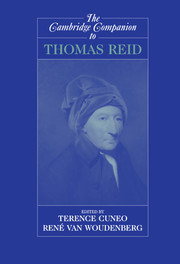Book contents
- Frontmatter
- Introduction
- 1 Reid in Context
- 2 Thomas Reid and the Culture of Science
- 3 Reid on Common Sense
- 4 Reid’s Theory of Perception
- 5 Reid’s Reply to the Skeptic
- 6 Nativism and the Nature of Thought in Reid’s Account of Our Knowledge of the External World
- 7 Reid and the Social Operations of Mind
- 8 Reid on Memory and the Identity of Persons
- 9 Thomas Reid’s Theory of Freedom and Responsibility
- 10 Reid’s Moral Philosophy
- 11 Reid’s Philosophy of Art
- 12 Reid’s Philosophy of Religion
- 13 Reid’s Influence in Britain, Germany, France, and America
- Bibliography
- Index
2 - Thomas Reid and the Culture of Science
Published online by Cambridge University Press: 28 May 2006
- Frontmatter
- Introduction
- 1 Reid in Context
- 2 Thomas Reid and the Culture of Science
- 3 Reid on Common Sense
- 4 Reid’s Theory of Perception
- 5 Reid’s Reply to the Skeptic
- 6 Nativism and the Nature of Thought in Reid’s Account of Our Knowledge of the External World
- 7 Reid and the Social Operations of Mind
- 8 Reid on Memory and the Identity of Persons
- 9 Thomas Reid’s Theory of Freedom and Responsibility
- 10 Reid’s Moral Philosophy
- 11 Reid’s Philosophy of Art
- 12 Reid’s Philosophy of Religion
- 13 Reid’s Influence in Britain, Germany, France, and America
- Bibliography
- Index
Summary
Around the time of Thomas Reid's death in October 1796, his contemporaries took stock of his accomplishments as a man of letters. One of the most challenging interpretations of Reid's life and career to appear came from the pen of his colleague, the Glasgow Professor of Mathematics, James Millar. Writing in an article devoted to the Gregory family (to which Reid was related), Millar commented that Reid was 'peculiarly distinguished by his abilities and proficiency in mathematical learning. The objects of literary pursuit are often directed by accidental occurrences. An apprehension of the bad consequences which might result from the philosophy of the late Mr. Hume, induced Dr. Reid to combat the doctrines of that eminent author. . . . But it is well known to Dr. Reid's literary acquaintance, that these exertions have not diminished the original bent of his genius, nor blunted the edge of his inclination for mathematical researches; which, at a very advanced age, he still continues to prosecute with a youthful attachment, and with unremitting assiduity.I
Millar’s portrait contrasts sharply with that found in what remains the most influential biography of Reid to date, Dugald Stewart’s Account of the Life and Writings of Thomas Reid, first published in 1802.
- Type
- Chapter
- Information
- The Cambridge Companion to Thomas Reid , pp. 53 - 76Publisher: Cambridge University PressPrint publication year: 2004
- 8
- Cited by



